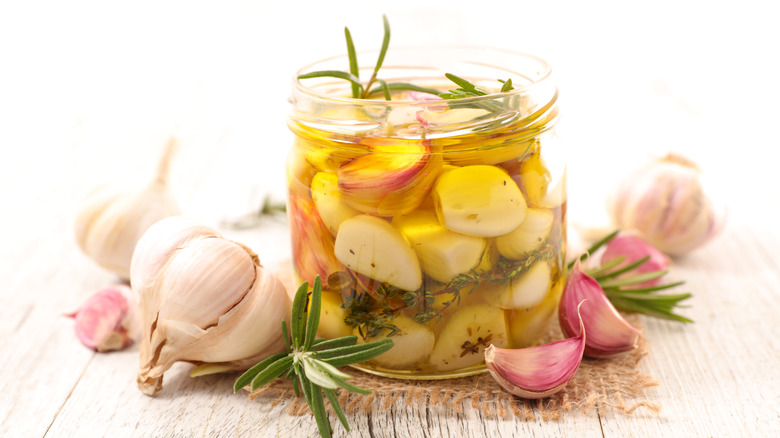Why It Can Be Dangerous To Make Garlic Confit
We may receive a commission on purchases made from links.
If you're a fan of the sweet, punchy taste of garlic, you've likely either tried or heard about garlic confit. Confit is a culinary term that means to "slowly cook an ingredient in fat," enhancing the flavors and texture, according to MasterClass. Garlic confit is slowly cooked while soaked in olive oil, resulting in garlic cloves that have a paste-like, spreadable texture and rich, sweet taste.
Garlic confit can be enjoyed in a number of ways, including something as simple as smearing it on toasted bread or adding it to sauces, soups, dressings, and more to enhance the flavor. The oil also gets infused with strong garlic aromas, which can be used in any number of applications.
All you need to do to whip up your very own batch of garlic confit is add garlic cloves to an oven-safe pot, add olive oil until the cloves are covered, and either cook slowly on the stove or in the oven at a low temperature. As delicious as garlic confit is, though, if prepared and/or stored wrong, it could lead to serious health issues.
Preventing botulism
Garlic confit isn't one of the biggest causes of botulism — the Center for Disease Control and Prevention reports an average of 110 cases of botulism per year in the United States and only a quarter of those are from food. However, it's still a possibility. The ideal conditions for Clostridium botulinum (the toxic bacteria that causes botulism) are present in environments low in acidity, without oxygen, and at room temperature, per PennState Extension.
If left at room temperature, garlic confit presents all those conditions for the toxin to flourish. The USDA advises that you keep all confit refrigerated below 40 degrees Fahrenheit, and for no longer than a week. If you use your garlic confit immediately out of the oven, or store it in a glass jar with at least 1/2-inch of space at the top and consume it quickly, the risk of botulism is low.
Unlike other illnesses that target your digestive system, botulism attacks your nerves. At best, you'll lose control of your facial muscles, including drooping eyelids, experience intense gastrointestinal upset, and have blurry vision, according to the Mayo Clinic. Even at this level, botulism is incredibly dangerous and must be treated by a medical professional immediately. As the toxin progresses, it will turn into trouble swallowing, speaking, and breathing, paralysis of some or all of your body, and oftentimes, death.

